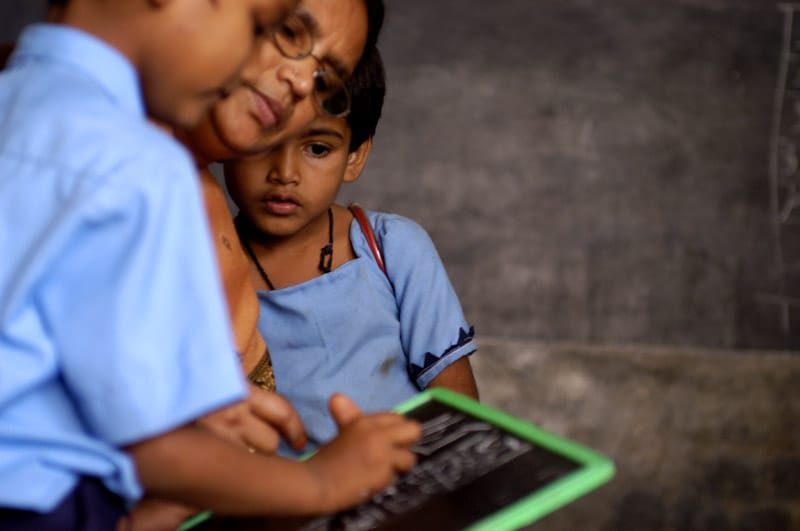Once in the middle of a class, one of my third graders started crying and she could not understand why. For the next week, she refused to step out of her house, breaking down at the thought of being around people. When she returned to school, she would not talk to other children and found it difficult to breathe when surrounded by others. Her parents found themselves at a loss and took her to various doctors and pandits.
One of my gloomiest childhood memories is the nightmares I’d get before the Math exam every few months. Usually, they involved someone beating me or trying to hurt me. I could never express my fear in words I could hardly understand my emotions. The dreams were mostly dismissed as another tantrum or an excuse to shirk from hard work.
Also read: Children In COVID-19 Lockdown: Abusive Households And Street Children
Later in life, these nightmares took the shape of panic attacks before every paper submission in college. My response to this was not sleeping for days, so I could avoid them altogether.
I saw the same patterns of fear in my students when I was teaching second and third graders at a government school in Delhi. I witnessed similar meltdowns in the classroom. It did not take me long to understand how this is associated with the lack of importance given to socio-emotional learning at school.
I saw the same patterns of fear in my students when I was teaching second and third graders at a government school in Delhi. I witnessed similar meltdowns in the classroom. It did not take me long to understand how this is associated with the lack of importance given to socio-emotional learning at school.
Some of my students were suddenly scared of people, there were incessant spells of crying, and hesitation to even talk on some days. The loss of words to describe their mental and emotional state distressed them further and this further manifested in them through physiological symptoms. When the physiological symptoms were dismissed by doctors, their families would resort to superstitions.
The lack of vocabulary defining the mental health of children is alarming for various reasons. Words not only help each of them talk about their state of being but also help them understand it better. This is why and where socio-emotional learning plays an important role.
Expanding that vocabulary and making it more accessible for the children is paramount. Currently, the words children use are limited to the ones they learn in English class. Words like happy, sad, or excited, just about help them express themselves vaguely, without understanding the complex emotions and feelings behind them.

In the past four months, all my telephonic conversations with my students have started with a response that they are good while sounding not confident in the limited vocabulary available to them.
Even as the world slows down due to COVID-19, I sit in my house with enough support and privilege to take care of my physical, mental, and emotional well-being, but I wonder about my students in their houses, unable to express themselves clearly, especially because of the lack of socio-emotional learning aids and counselling.
We can all count the months we have spent in our homes. But counting every hour, minute and second, looking forward to the next day when we can step outside seems a little too much. But is it really?
For my students, stepping outside would mean them being in a space where they can learn to express themselves better than before. The lockdown not only brought the normalcy of our lives to a grinding halt, but it also revealed the horrid face of this so-called new normal.
Enough has been said about people who have the vocabulary to express their mental wellbeing. But for the many others who cannot, we need to initiate a conversation that particularly revolves around children and their socio-emotional learning. The urgency to teach our children socio-emotional learning at school to help them express their psychological and physiological needs is crucial, now more than ever before.
It is imperative that we create a comprehensive socio-emotional learning curriculum that enables children to understand themselves and develop self-awareness, socio awareness while focusing on self-care and responsible decision making.
Most children have spent the past five-six months hoping that they will be able to get out the next day, only to find themselves in an endless state of utter confusion. Our children need a socio-emotional learning (SEL) curriculum that focuses not only on the ways to cope with these challenging times, but also to understand and be sensitive to their responses to it.

Through a socio-emotional learning curriculum, we need to empower children with the means and vocabulary to comprehend their feelings and emotions. When the lockdown happened, educators and parents questioned the academic loss, when what they should have spoken about is the socio and emotional well-being of a child. In the process of facilitating everyday lessons, homework, assignments, tests and projects to the children, the mental exhaustion that the little minds must have undergone has largely been a non-issue to most stakeholders in education – be it the teachers or parents. There is a need to fix this and make it easier for the little children to adapt to the fast-changing times.
When we emerge out of the lockdown, our kids would have faced and dealt with a lot of uncertainty and anxiety, without the means to understand and describe it. A good socio-emotional learning curriculum will also build reflection and adaptability among individuals.
When we emerge out of the lockdown, our kids would have faced and dealt with a lot of uncertainty and anxiety, without the means to understand and describe it. A good socio-emotional learning curriculum will also build reflection and adaptability among individuals.
Also read: Sexual And Reproductive Health: The Missing Link In NEP 2020
We need to have a conversation with our children about the legitimacy of all emotions; good and bad. We need to build a curriculum that makes children recognise what they are feeling and provide them with the tools to address it. Children should be able to distinguish their psychological symptoms from physiological indicators.
They also need to be taught that sometimes the physiological symptoms are psychosomatic. We have been consistently denying children from connecting to their socio-emotional well-being. While meditation and calming exercises might help to deal with distress, it is important to also understand what distress seems like. No one should be dreading the question of how they’re feeling, that happens because they are incapable of understanding the impact of this query.
While we must make psychotherapy available to children, it is a point of loss if we do not see the need and urgency in it. The future of the classroom and home should be a democratic space where a child can freely express and understand themselves through different ways of expressions and words. A question such as “How are you?” especially to children, should probe beyond answers such as “fine” and “good”, and attempt to understand how one is feeling and why.
Amita Nowal is an educator. In the past, she has worked as a Fellow with Teach for India and now she is with The Community Library Project as a reading fluency teacher. She feels deeply about socio-emotional learning and the free library movement. She can be found on Twitter as well as on her email address: amitanowal4@gmail.com
Featured Image Source: The Federal





Thanks for this blog, I really enjoyed reading your post.
https://uchaai.com/contact-us/